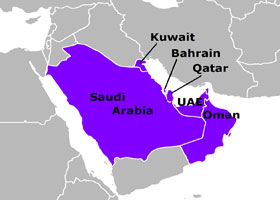 Months of bitter sectarian fighting in Syria is deepening the divide between the branches of Islam in Persian Gulf states far from the battlefield, as Sunnis and Shiites wage dueling campaigns to drum up cash and supplies for Syria’s partisans, Western officials and independent experts say.
Months of bitter sectarian fighting in Syria is deepening the divide between the branches of Islam in Persian Gulf states far from the battlefield, as Sunnis and Shiites wage dueling campaigns to drum up cash and supplies for Syria’s partisans, Western officials and independent experts say.
The strain of the nearly three-year-old conflict is showing in countries such as Kuwait, where the fighting has inflamed tensions between Shiite and Sunni communities that have coexisted in relative harmony for decades. Today, both groups are being drawn deeper into the conflict as they send money and recruits to support opposing sides, the officials and analysts said.
“There has been a noticeable change in the level of sectarian rhetoric from both sides,” said Elizabeth Dickinson, author of a Brookings Institution study on the spillover from Syria in the wealthy Gulf emirates. While sectarian tensions have been on the rise since the start of the Arab Spring revolts in Bahrain and Syria, “they have grown worse,” she said.
The Brookings report, formally unveiled Thursday, warns that prolonged fighting in Syria “indirectly pits elements” of the Gulf’s diverse communities against one another, creating resentments and animosities that can’t be easily pushed aside.
“Unlike policy agreements, the social implications of a sectarian conflict cannot be signed away with a political deal,” the report said.
Other officials and experts also noted an increasingly militant tone among some Gulf-based supporters of Syria’s armed factions. Some groups are openly advocating donations of weapons as well as cash to their favorite militias, while others are publicly aligning themselves with more radical Syrian factions such as Jabhat al-Nusra, which is linked to al-Qaeda.
“At minimum, there is no consequence for taking such a stance, and a maximum, it is a badge of honor within more activist circles,” said a former U.S. official who specialized in tracking Gulf-based jihadist movements and who spoke on the condition of anonymity because much of his work for the government was classified. “Among the more religiously conservative groups, you want to be seen as forward-leaning when it comes to helping fellow Sunnis.”
The fresh evidence of spillover from the conflict comes amid reports of further setbacks to broker peace talks between Syria’s warring factions. Robert S. Ford, the State Department’s primary envoy to the opposition, said Wednesday that an effort to reach out to Islamists not linked to al-Qaeda had failed.
“The Islamic Front has refused to sit with us without giving any reason,” Ford said in an interview with al-Arabiya television.
The Islamic Front, an alliance announced last month among seven of the largest rebel opposition groups in Syria, is said to include numerous fighters from Gulf countries and to receive funding from Saudi Arabia. Although it seeks the establishment of an Islamist state in Syria, it has no formal ties with the Islamic State in Iraq and Syria or Jabhat al-Nusra, both of which have been designated by the United States as terrorist organizations.
Separately, the Obama administration imposed financial sanctions against two men accused of raising money for al-Qaeda affiliates in Syria as well as Yemen. One of the men, Abd al-Rahman bin ’Umayr al-Nu’aymi, a Qatar resident, was accused of transferring $600,000 to an al-Qaeda official in Syria.
Private Qatar-based charities have taken a more prominent role in recent weeks in raising cash and supplies for Islamist extremists in Syria, according to current and former U.S. and Middle Eastern officials. One such charity, Madid Ahl al-Sham, was cited by Jabhat al-Nusra in August as one of the preferred conduits for donations intended for the group.
Jabhat al-Nusra’s endorsement of the Qatari charity, announced in a pair of Twitter postings, was promptly reposted by the charity on its own Twitter page. The same group announced in May that it was expanding its campaign to collect weapons for Syria’s Islamist rebels. The announcement, on the group’s Facebook page, was accompanied by a videotaped endorsement by Sheikh Wagdy Ghanim, a cleric who was forced to leave the United States in 2004 because of alleged support for terrorist groups.
Kuwaiti Sunnis have been among the most prominent financial supporters of Syria’s rebels, raising tens of millions of dollars through both traditional charity functions and online canvassing using social media sites. Prominent Sunni families have sent sons to fight for Islamist rebels in Syria, and Kuwaiti Twitter and Facebook pages devoted to the conflict regularly applaud the slaughter of Shiite forces loyal to President Bashar al-Assad.
Although less conspicuous, Kuwaiti Shiites have launched parallel efforts to build support for Syria’s pro-government Shiite and Alawite communities, according to the Brookings report. At a forum in Kuwait City last year, a Shiite group claimed to have raised the equivalent of $81 million for Assad’s forces. Many of the country’s city-dwelling Shiites have begun to refer to Sunnis as “Bedouin” who are less authentically Kuwaiti, the report said.
“Now the talk is about Shia-Sunni,” a Kuwaiti newspaper editor was quoted as telling the report’s author. “It has become popular, very normal. . . . It wasn’t like that in Kuwait.”
Washington Post

Leave a Reply
You must be logged in to post a comment.